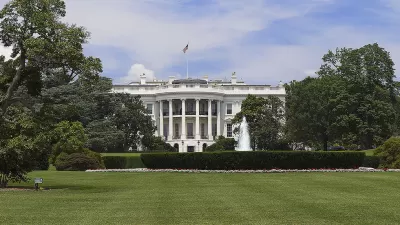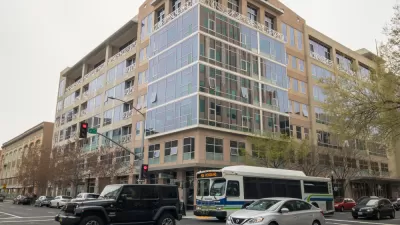The Biden administration has proposed a suite of policy and funding programs designed to create and protect 100,000 affordable housing units. If successful, the program will still fall well short of the need.

In a statement echoing its pledge to "Build Back Better," the Biden administration this morning announced a plan to create 100,000 additional affordable homes.
While it announces clear support for affordable housing development, the proposal is unlikely to bridge the immense gap between the supply of affordable housing and the need. The National Low Income Housing Coalition estimates that the country needs 7.2 million affordable housing units to fill the gap between supply and demand. For a comparison of ambition, New York City Mayor Bill de Blasio in 2014 proposed an affordable housing program that aimed to create or protect 200,000 housing units.
In announcing its support of a supply-side approach to the affordable housing shortage, the proposal clearly acknowledges the role of supply and demand imbalance in the rising cost of housing around country. "The large and long-standing gap between the supply and demand of affordable homes for both renters and homeowners makes it harder for families to buy their first home and drives up the cost of rent," reads the statement.
The statement also acknowledges the supply constraints caused by the increasing footprint of large, institutional, and corporate investors in the housing market—positioning the announcement on the YIMBY side of the spectrum of U.S. housing and development politics.
To create and protect 100,000 units, the proposal relies mostly on the financial mechanisms of federal institutions to unlock new opportunities for affordable housing. For example, the proposal would boost affordable housing supply by relaunching the Federal Financing Bank—a partnership between the U.S. Department of Treasury and the U.S. Department of Housing and Urban Development. The Federal Financing Bank allows state housing finance agencies to provide low-cost capital for affordable housing development.
Another financing mechanisms included in the proposal would increase the Low Income Housing Tax Credit (LIHTC) investment cap. The LIHTC program was blamed by a recent article published by the Financial Times for creating some of the market for companies like Blackstone to make large inroads into the housing market.
The proposal announces a forthcoming funding availability through the U.S. Department of Treasury's Capital Magnet Fund (CMF). "This year’s historic pool of $383 million in available funding will facilitate the production of affordable housing units throughout the country," according to the statement.
The proposal also shows direct support for manufactured homes and duplexes, three-plexes, and four-plexes—the latter variety of residential density has been the desire of a series zoning reforms approved by a growing number of cities and states. To support these alternative housing typologies, the proposal notes a recent decision by the Federal Housing Finance Authority (FHFA) to accept loan delivery on single-wide manufactured housing. The FHFA also recently authorized Freddie Mac to revisit mortgage eligibility requirements for 2-4 unit properties. Eligibility requirements approved in 2020 "reduced financing available by Freddie Mac for these kinds of properties," according to the proposal.
Among the other provisions of the proposal, the Biden administration promises to leverage federal funding to spur state and local zoning reforms, which might read at first glance as similar to the program proposed by the Housing Supply and Affordability Act, authored by Senator Amy Klobuchar (D-Minn.), with Senator Tim Kaine (D-Virginia), and Senator Rob Portman (R-Ohio) in March 2021. However, this proposal would target HUD block grant funding buy tasking the HUD Office of Community Planning and Development with the creation of a Housing Supply Toolkit, with guidance for deploying existing block grants and other resources to address supply and affordability challenges.
More specifics on the Biden administration's foray into housing policy—announced a day after the scheduled expiration of the federal government's eviction moratorium—are included in the article posted on the White House's website. Planetizen will continue tracking reactions and analysis to the proposal in the coming days.

Trump Administration Could Effectively End Housing Voucher Program
Federal officials are eyeing major cuts to the Section 8 program that helps millions of low-income households pay rent.

Planetizen Federal Action Tracker
A weekly monitor of how Trump’s orders and actions are impacting planners and planning in America.

Ken Jennings Launches Transit Web Series
The Jeopardy champ wants you to ride public transit.

Washington Legislature Passes Rent Increase Cap
A bill that caps rent increases at 7 percent plus inflation is headed to the governor’s desk.

From Planning to Action: How LA County Is Rethinking Climate Resilience
Chief Sustainability Officer Rita Kampalath outlines the County’s shift from planning to implementation in its climate resilience efforts, emphasizing cross-departmental coordination, updated recovery strategies, and the need for flexible funding.

New Mexico Aging Department Commits to Helping Seniors Age ‘In Place’ and ‘Autonomously’ in New Draft Plan
As New Mexico’s population of seniors continues to grow, the state’s aging department is proposing expanded initiatives to help seniors maintain their autonomy while also supporting family caregivers.
Urban Design for Planners 1: Software Tools
This six-course series explores essential urban design concepts using open source software and equips planners with the tools they need to participate fully in the urban design process.
Planning for Universal Design
Learn the tools for implementing Universal Design in planning regulations.
Heyer Gruel & Associates PA
Ada County Highway District
Institute for Housing and Urban Development Studies (IHS)
City of Grandview
Harvard GSD Executive Education
Toledo-Lucas County Plan Commissions
Salt Lake City
NYU Wagner Graduate School of Public Service






























